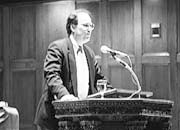

Final Convocation Speculates on Arts
by Miles Clark
Noted journalist James Keller (OC '75) returned to Oberlin on Tuesday Evening to deliver his address "The future of culture in America." The lecture was the 4th and final part of Oberlin's 1999-2000 convocation series.
In keeping with tradition, President Nancy Dye introduced him. Keller, a double-degree student while at Oberlin, currently writes for The New Yorker. He has written for numerous publications, including Opera News, Travel and Leisure, and The Sunday New York Times. He is the program director for the New York Philharmonic, and has been a commentator on National Public Radio's "Performance Today", "Morning Edition", and "Evening Edition", among others. He has lectured at the Lincoln Center, and at the Metropolitan Museum of Art.

|
|
Facing the Future: James Keller spoke on culture in the U.S. (photo by Christine Braunohler) |
Keller immediately admitted to the audience that neither he, nor anyone else, could possibly predict exactly what the future of culture will look like. As he has read all the stories appearing in the coming issue of The New Yorker, he "can predict the future up to March 21st with some certainty - but after that my crystal ball becomes cloudy."
"We should probably get 'culture' out of the way early on," Keller said. He considers culture to be the domain of the arts and humanities, and that the people who promote it include not only the artist and the consumer, but also teachers, museum curators, and all others involved in the process of artistic expression.
Keller proceeded to move on to discuss the current state of culture. He asserted that public interest in the arts is declining. Moreover, he stated that the government has shifted funds away from the arts. "Our next government may eliminate arts funding altogether," said Keller.
With the government pulling away from the arts, Keller believes that "the philanthropic lifeline may lie in the hands of corporate sponsors." He expressed skepticism of the sort of subtle - and often blatant - control corporations could then wield over culture. Furthermore, Keller indicated that recent trends reflect that such funding would be sparse at best. "The new generations of millionaires seem to be putting their resources into education and health care; frankly, they seem indifferent to culture," he said.
Keller then discussed the fundamental shifts which he believes art will experience. He stated that concepts of artistic originality will undergo "a major overhaul." He asserted that as the world becomes more globalized, indigenous cultures will eventually fall away. As to what future multicultural art may look like, he cited post-modernism as a possible example. "Images appear jumbled, and make sense only when taking into consideration their reference points," he said. He stated that the internet will become a primary template for new artistic forms and concepts.
Furthermore, he asserted that the internet will eventually allow people to enjoy art without ever having to leave their seats. Instead of traveling to museums to see paintings, "people, without the intervention of a curator, will create their own personal galleries from the selections on museum websites," he said.
While he asserted that traditional and electronic art will for a time coexist, he expressed confidence that digital is bound to win out. "It will certainly be less messy to create a painting on a computer program than it is to splotch colors on a canvass," Keller said. He stated his fear that the greatest artists of the future might be merely those individuals most adept at navigating certain types of software.
Keller infused the lecture with several audio tapes of live performances. "You can feel the energy of the crowd as it reacts to the performer's voice," Keller said of one piece. "I am worried that future generations might lose this."
The end of the address was followed by several questions. Keller refuted a claim that people will inevitably want to see events that are authentic, instead of transcribed over a computer screen. He stated that in the future, people will simply not have the chance to experience the communal vitality of a live performance. "What we must do is keep the spirit alive for the next generation for future art lovers. Without our memories, art may lose one of its most essential mediums," he said.
Copyright © 2000, The Oberlin Review.
Volume 128, Number 17, March 10, 2000
Contact us with your comments and suggestions.
|
News
|
Perspectives
|
|
|
Arts
|
Sports
|
Other
|